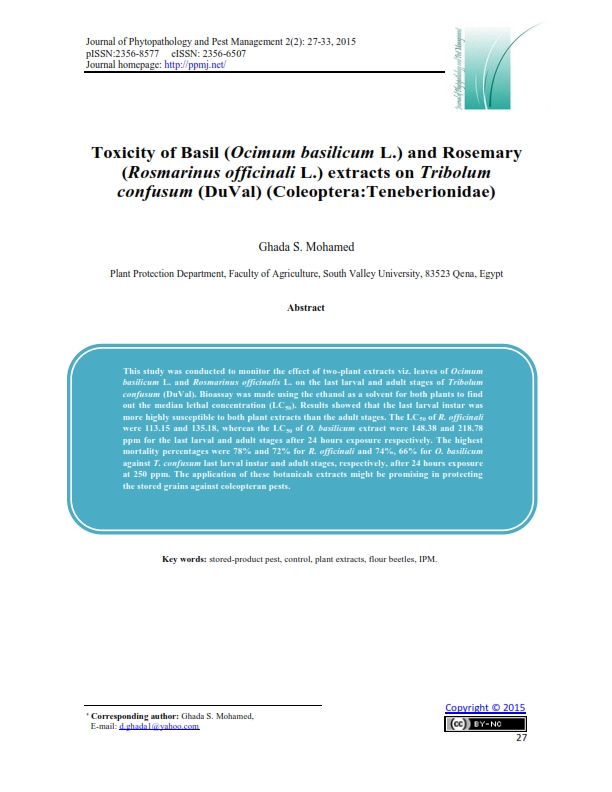Toxicity of Basil (Ocimum basilicum L.) and Rosemary (Rosmarinus officinali L.) extracts on Tribolum confusum (DuVal) (Coleoptera:Teneberionidae)
Palabras clave:
stored-product pest, control, plant extracts, flour beetles, IPM.Resumen
This study was conducted to monitor the effect of two-plant extracts viz. leaves of Ocimum basilicum L. and Rosmarinus officinalis L. on the last larval and adult stages of Tribolum confusum (DuVal). Bioassay was made using the ethanol as a solvent for both plants to find out the median lethal concentration (LC50). Results showed that the last larval instar was more highly susceptible to both plant extracts than the adult stages. The LC50 of R. officinali were 113.15 and 135.18, whereas the LC50 of O. basilicum extract were 148.38 and 218.78 ppm for the last larval and adult stages after 24 hours exposure respectively. The highest mortality percentages were 78% and 72% for R. officinali and 74%, 66% for O. basilicum against T. confusum last larval instar and adult stages, respectively, after 24 hours exposure at 250 ppm. The application of these botanicals extracts might be promising in protecting the stored grains against coleopteran pests.
Métricas

Descargas
Publicado
Cómo citar
Número
Sección
Licencia
Authors who publish with Journal of Phytopathology and Disease Management agree to the following terms:
- Authors retain copyright and grant the journal right of first publication with the work simultaneously licensed under a Creative Commons Attribution License that allows others to share the work with an acknowledgement of the work's authorship and initial publication in this journal.
- Authors retain copyright and grant the journal right of first publication with the work simultaneously licensed under the Creative Commons Attribution-Non Commercial License (CC BY-NC). This allows others to share the work with an acknowledgement of the work's authorship and initial publication in this journal.
- Archives of Agricultural Sciences Journal is an Open Access Journal, and articles published are distributed under the terms of the Creative Commons Attribution-Non Commercial License (CC BY-NC). Readers may copy, distribute, and display the work for non commercial purposes with the proper citation of the original work. However, the journal retains the right to exploit subsidiary rights on behalf of the authors.
- Authors are able to enter into separate, additional contractural arrangements for the non-exclusive distribution of the journal's published version of the work (e.g. post it to an institutional repository or publish it in a book), with an acknowledgement of its initial publication in this journal.
- Authors are permitted and encouraged to post their work online (e.g., in institutional repositories or on their website) prior to and during the submission process with full disclosure to the journal, as it can lead to productive exchanges, as well as earlier and greater citation of published work. Following publication in Archives of Agricultural Sciences Journal, the author should update the repository, and include a citation and link to the published work.
Click here for more information on Licensing policy
.png)




